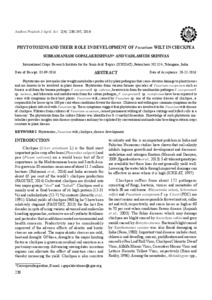Phytotoxins and their role in development of fusarium wilt in chickpea
Abstract
Phytotoxins are low molecular weight metabolites produced by plant pathogens that cause obvious damage to plant tissues and are known to be involved in plant disease. Phytotoxins from various formae speciales of Fusarium oxysporum such as fusaric acid from the banana pathogen F. oxysporum f. sp. cubense, beauvericin from the muskmelon pathogen F. oxysporum f. sp. melonis, and bikaverin and norbikaverin from the cotton pathogen, F. oxysporum f. sp. vasinfectum have been reported to cause wilt symptoms in their host plants. Fusarium wilt, caused by Fusarium sp. one of the serious disease of chickpea, is responsible for losses up to 100 per cent when conditions favour the disease. Chlorosis and wilting are common symptoms on the chickpea plants infected with Fusarium sp. These symptoms suggest that phytotoxins are involved in the Fusarium wilt disease of chickpea. Filtrates from cultures of Fusarium acutatum, caused permanent wilting of chickpea cuttings and killed cells in a bioassay. The phytotoxin from the culture filtrate was identified as 8-O-methyl-fusarubin. Knowledge of such phytotoxic metabolites provides insights into disease syndromes and may be exploited by conventional and molecular breeding to obtain crops resistant to plant disease

